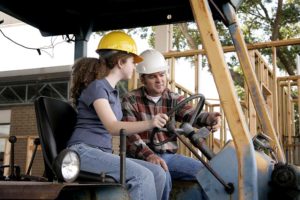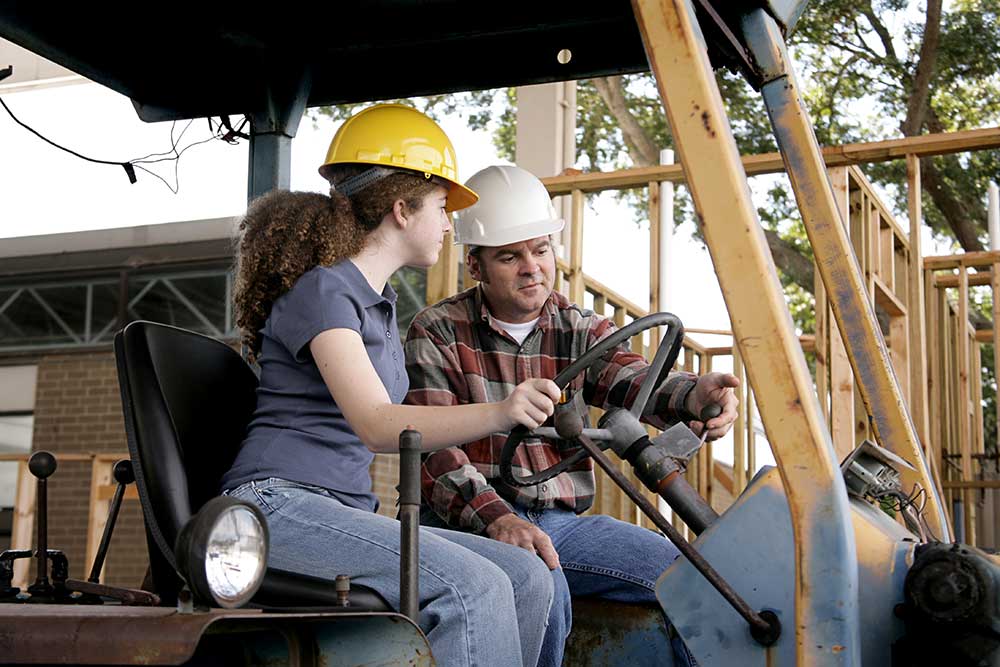Disclaimer: The information on our website is provided for general information purposes only. We make no representations or warranties of any kind, express or implied, about the completeness, accuracy, reliability, suitability or availability with respect to the website or the information contained on our website for any purpose. Any reliance on such information is therefore strictly at your own risk and we are not liable for any damages or losses arising out of or resulting from your reliance on any information contained on our website.
A construction equipment operator works on construction sites and operates the heavy machinery. Because of this, they may spend a great deal of time outdoors. However, they may be protected by the elements when inside the equipment they are operating. Watch a video to learn what an operator does.
How to Become a Construction Equipment Operator
Most construction equipment operators learn on-the-job after earning a high school diploma or GED. Alternately, some operators learn this trade at a vocational school or through an apprenticeship program. In high school, taking any auto shop classes (if available) is helpful as some workers may perform general maintenance or small repairs at job sites if able.
Job Description of a Construction Equipment Operator

No matter the equipment these operators are driving or working, construction equipment operators must ensure they keep their equipment in working order – this means they would clean the equipment and maintain it. This is necessary not only for safety, but also to minimize lost time at a job site. They must also be good verbal and non-verbal communicators as they often need to communicate quick messages via hand signals and vocal commands.
Being a good team member is vital as construction crews work in unison to accomplish the task at hand together. An equipment operator’s role may be to move earth or other heavy materials to and from the construction site. They may also prepare a job site by clearing debris or other material so other workers or equipment can access the location. There are also various types of construction equipment operators and a person may be skilled at operating multiple types depending on the job requirements.
Excavating and Loading Machine and Dragline Operators Career Video Transcript
Moving mountains may sound impossible, but material moving machine operators do it all the time, one load of earth at a time. They use machinery to move heavy materials around building sites, warehouses, ships and mines. Material moving machine operators use a variety of equipment in different settings. Most of these operators drive forklifts moving materials around warehouses, storage yards, or worksites. They may operate conveyor belts to pick up merchandise, and move it to and from large warehouses, building sites and vehicles.
Many operators work for underground and surface mining companies digging mines to extract coal, ore and other materials. They load material onto shuttles or conveyors running from a mine to the surface. Some operate platforms and cages that raise workers and materials up to elevated construction sites or lower them down into mines and quarries. In construction, these machine operators clear space for buildings with excavators, and operate cranes to load and unload building materials.
Cranes are also used at ports to move cargo, and at iron and steel mills. Dredge operators shift large quantities of sand and gravel from the bottom of rivers, lakes and other waterways so that ships and boats can move freely. Safe equipment operation is a top priority in this field; injury and illness rates are higher than most occupations. Workers wear gloves, hardhats, or respirators as needed. Most material moving machine operators work full time— sometimes with overnight shifts— and overtime is common. Although there are typically no formal education requirements, a high school education may be preferred for some positions, and is often required for crane operators, excavating machine operators, and dredge operators. Some states and cities require licensure for crane operators.
Article Citations
Bureau of Labor Statistics, U.S. Department of Labor, Occupational Outlook Handbook, Construction Equipment Operators.
National Center for O*NET Development. 47-2073.00. O*NET OnLine.

